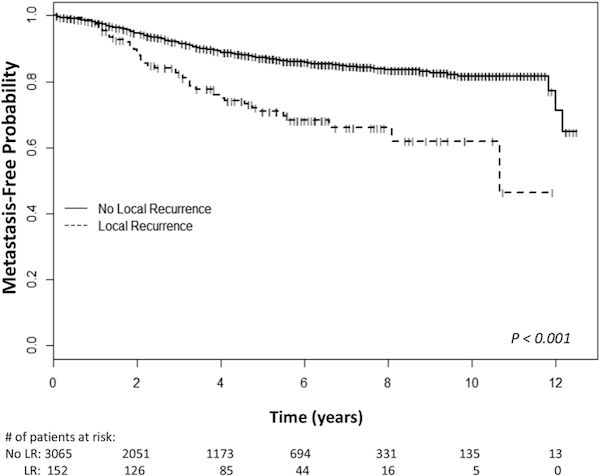The Ophthalmic Oncology Task Force, including doctors from The New York Eye Cancer Center, just published the results of one of the largest multi-center, international studies of eye cancer in history. Their findings were published in Ophthalmology, the most widely read journal in the discipline, from the American Academy of Ophthalmology.
This study has shown that the risk of developing metastasis is 6.28 times greater for uveal melanoma patients whose tumor regrows after initial treatment.
This result tells us that ocular oncologists should do all they can to prevent local treatment failure after first-time treatment of choroidal melanoma. Failure to do so gives the tumor a significantly higher chance of metastasizing to the rest of a patient’s body.

Chart: Difference in survival rates between the local recurrence group versus the non-local recurrence group over time.
This is the largest single collection of uveal melanoma data to date, and the second largest multicenter study of eye cancer by patient-participants. It included 10 top ophthalmic oncology centers from 8 countries (Argentina, Canada, Japan, Russia, Spain, Sweden, The Netherlands, and the United States) in 4 continents (North and South America, Europe, and Asia). The study looked at 3,377 patients diagnosed and treated in a 10-year span from April 1, 2001 through April 30, 2011.
Multicenter cooperation on this scale is rare, but in this case it has provided the international oncology community with very important and compelling results. These results are not just theoretical – they provide a concrete direction for the evolution of eye cancer treatment. All eye cancer specialists should review this research and strive to update their practices accordingly.
Ocular oncologists may opt for a more cautious first-time treatment of uveal melanoma to allow patients to keep both their vision and eye. Though such a treatment plan comes from a place of compassion, this study reveals this more sympathetic approach could ultimately increase a patient’s chance of dying from metastatic disease.
The New York Eye Cancer Center is proud to have played a leading role in this unprecedented international research, funded by The Eye Cancer Foundation and the Paul T Finger MD Fund for Internet Technology in Ophthalmic Oncology.
You can view the scholarly article of this research here:










Diagnosed 8/2012 treated within 2 months at UF proton therapy Institute Jacksonville FL
Every possible step–8 surgeries, cataract– laser treatments–ahmed valvex2 –shots in the eye–trip to mayo clinic (Jacksonville) USF Eye Institute Tampa–finally had eye removed 3 years of grief later. So far so good no sign of metastasis. Of course I wanted to try and save the eye, but was a great waste of my time an resources, wish now I’d had it removed in the beginning.